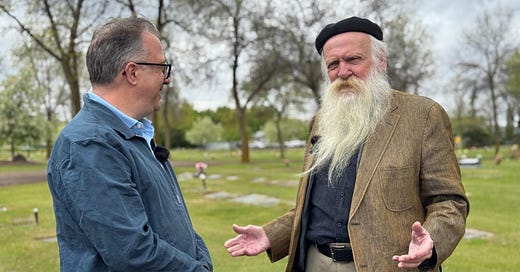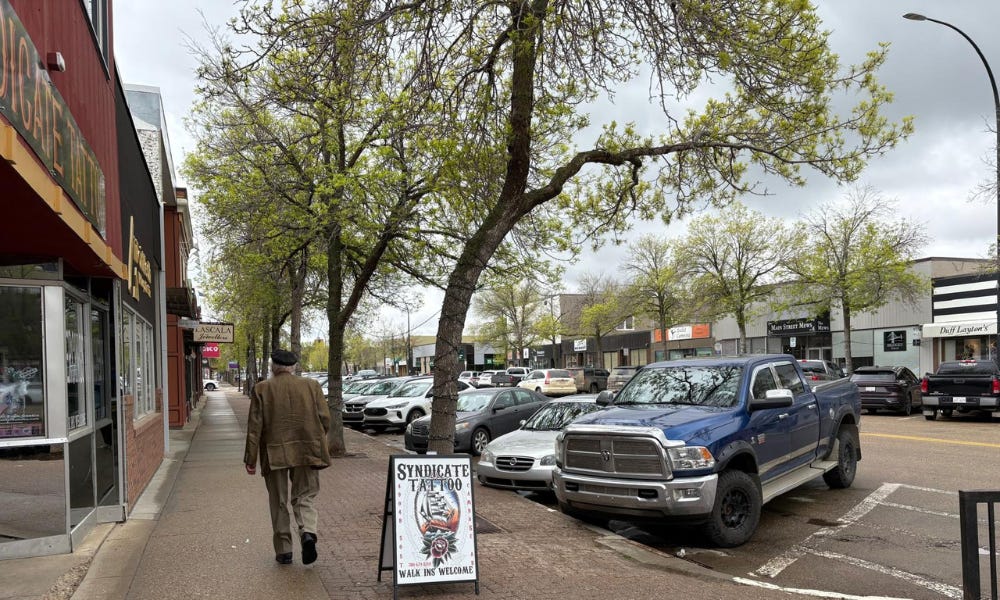“Most people are better than their theology.”
David Goa, quoting his father
“Every meeting with a stranger is an annunciation. It is only a matter of if we hear.”
David Goa
“Someone who has actually tasted truth is not contentious for truth. Someone who is considered by people to be zealous for truth has not yet learnt what truth is really like; once he has truly learnt it, he will cease from zealousness on its behalf.”
David Goa, quoting Saint Isaac the Syrian, 7th Century Christian Bishop
A couple of days ago I was in Camrose, Alberta, just outside Edmonton, with my co-workers Amanda and Allison. We had flown to Edmonton and were flying back the same day. The occasion for this quick trip was to be present for the honouring of a friend. David Goa has been a key part of the formation of our understanding of hopeful Christian theology. David is a professor, writer, museum curator, and Orthodox theologian (along with a recurring guest on the podcast I host, Rector’s Cupboard). He was founding director of the Chester Ronning Centre for the Study of Religion and Public Life at the University of Alberta, Augustana.
David has been all over the world for his work. He has been a model of what faithful engagement across cultural and religious lines can look like. He has shown us, in ideas and in daily living, that Christian faith, at its best, is blessing to everyone, even those who do not share the belief. David was being honoured for having been awarded the King Charles III Coronation Medal. The Lieutenant Governor of Alberta who bestowed the honour upon David is Salma Lakhani. Lakhani is of Ismaili Muslim faith. She is the first Muslim person, of South Asian descent, to hold the role of viceregal in Canada.
At the ceremony, there was much talk of David’s Christian faith and of how he has been an example of the love of God for all people. A number of Christian people spoke about how David’s writing and teaching changed their lives and helped them to discover the hopeful depths of their faith.
There were also speakers and contributors of other faiths. Omar Khadr was there. You might recall Khadr’s story. He was a teenager when the American military came upon the house of his family in Afghanistan. Relatives of his had some connection to Al-Qaeda. Members of his family were killed in the military operation and he was captured and imprisoned in Guantanamo Bay in Cuba. The charge against him was murder and the accusation was that he had thrown a grenade that had resulted in the death of an American soldier. He was 15 years old at the time. He became the first person since World War II to be prosecuted for war crimes committed while a minor. Khadr is a Canadian citizen and through legal challenges he eventually wound up in Edmonton, still serving a sentence. This is where his path crossed with David Goa’s. David became spiritual advisor to Omar Khadr. David has told me on numerous occasions of Khadr’s gentleness and humility.
As I sat listening to the speakers of various faiths, I took note of Omar Khadr, sitting near the stage. He looked so grateful to be there and so grateful to know David.
I thought to myself - it is possible that we can live out the beauty of our Christian faith. This faith can be beautiful.
You might know that verse that mentions that Christians might be a pleasing aroma to some people and stench to others.1 It says that a pleasant sensation will be noticed by those who are “being saved” and a stench by those who “are perishing”. Evangelical culture tended to interpret this passage by identifying fellow Christians (or fellow evangelicals) as those who were being saved and anyone who believed differently as those who were perishing. However, the passage itself warns only against people who are peddling the faith for profit.
I am familiar with the fear and warnings against other faiths that can be present within evangelical culture. What is often stressed in such fear is the otherness of anyone who does not believe what we believe. The most important thing, in such ways of thinking, are the lines, the differences, and the only Christian thing to do is to negate the faith of the other.
David Goa shows me a way of faith that I see now as more faithful, certainly more hopeful and obviously more Christ-like. The stench that the verse mentions is to those who are perishing because identifying the other as enemy, as opponent, as someone to be defeated, is always a way of death. If you hold a hopeful faith, that faith will be a stench to those who insist upon hard lines. It is possible, however, as demonstrated by David and others, to live out a beautiful faith.
I am enlivened in this, as well, by the fact that David knows the verses and the text and the history and the theology better than those detractors against his hopeful way of faith. His is no sentimental, weak, and timid faith. He is one of the most well read, fiercely intelligent people I have ever known.
Finally, as I reflect with gratitude upon the occasion, I am moved to consider how world-changing and internationally influential ways of seeing and believing are rooted in the ground of small places. Your hopeful faith will arise in the particularity of your life, your community.
Allison, Amanda, and myself, having travelled from Vancouver, were pleased to have lunch with David in Camrose before the ceremony. After lunch, we visited a cemetery. There David spoke with us about his own history, his the heritage of his faith, and way of seeing. The impulse to a hopeful faith was, for David, established in the land where he was born. He saw a connection not only to people of other faith, but to people who were long departed from this earth, people he always refers to as “of blessed memory.”
In the end, Christian faith is about connection, not disconnection; about solidarity, not separation. David Goa is one among a chorus of voices who remind us of this and who remind us that Christian faith can be beautiful and healing.
Below is an audio clip from conversation at the cemetery.
In the weeks ahead, Rector’s Cupboard will release a three part series that is conversation with David Goa about the “new fundamentalisms” in the world today. If you listen to the conversation, I am confident that you will hear the hopeful way of faith that David reminds us is possible.
2 Corinthians 2:14-16







